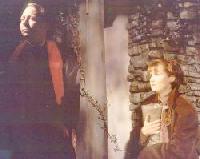SEARCH CurtainUp
On TKTS
LETTERS TO EDITOR
REVIEWS
FEATURES
ADDRESS BOOKS
Broadway
Off-Broadway
DC
NEWS (Etcetera)
BOOKS and CDs
OTHER PLACES
Berkshires
DC (Washington)
London
Los Angeles
QUOTES
FILM
LINKS
MISCELLANEOUS
Free Updates
Masthead
Type too small?
NYC Weather
 LA
Review
LA
Review
Mislaid Heaven by Laura Hitchcock

Carl J. Johnson and Marci Hill
(Photo: by Michael Scheer ) |
The conflicts, both political and psychological, are well drawn in the family of Maeve O'Hare, whose three sons died in the cause of independence. She's estranged from her daughter Margaret who emigrated to Boston and on scornful terms with daughter Rosemary who married an Englishman. Maeve accuses her of marrying for money but Rosemary retorts her mother's marriage wasn't happy, either. The only child Maeve has left is her wild teen-age daughter Ruth who spends most of her time gallumping on the moors with her best friend Samuel. Samuel's brother Casey and his friends Patrick and Fegan are active in the Brotherhood or Whiteboys who continue their guerilla tactics against the Ascendency lords in their mansions by slaughtering cattle and, ultimately, people.
Edward Shilling, the English master of the manor, is an amiable fellow who oozes entitlement. When Samuel is betrayed by Rosemary and forced to flee the country, Ruth becomes a different person. Outwardly conservative and proper, she has secretly joined the Brotherhood. Her assignment is to murder Shilling who, unknown to her, is her father.
Although the play has its melodramatic elements, the texture embodies the mixed strands of Anglo-Irish relationships. Becker writes characters very well and, once the taut second act begins, the piece is impelled towards its climax. Elements of Gaelic lore, which give the story a sense of place and tradition, recall the Irish plays of Marina Carr. When Father Jarell accidentally switches Samuel and Ruth's names when christening them, Maeve whispers of the transmigration of souls. She herself has followed the pagan ritual of burying her three sons in the sea, a sea cave and a tree, rather than interring them in blood-soaked Irish ground. And the wells, of course, begin to display healing powers.
The audience is drawn into the atmosphere of the play immediately as fog swirls around Desma Murphy's superbly rendered stone-walled set, subtly lit by Robert L. Smith. The excellent ensemble are extremely well served by Ken Sawyer's direction, which blends the Irish flair for the dramatic with an inspired sense of grouping and space on the theatre's small stage. Central characters are played by Marci Hill whose portrayal of Ruth never hits a false note as she ranges from a boisterous teen-ager to a woman of steel and Taylor Gilbert, intuitive enough to underplay her bitter mother Maeve. James K. Ward's portrayal of Edward Shilling fits him like a glove; he catches all facets of a man who is elegant, kindly and lost . Tripp Pickell makes a passionate Samuel McBride, Ruth's best friend, soul mate and lover. Of The Brotherhood trio, Paul Witten as Samuel's older brother, Casey; is terrifyingly intense. Lance Guest portrays Fegan as a thoughtful lad who urges moderation to no avail. Joel Mahr is Patrick, proud and jealous of his authority. On a subtly wry note, Nancy Kaine's Rosemary has become more English than the English. Father Jarell is a thinly written character, with none of the force or charisma often found in Irish priests, but Carl J. Johnson succeeds in giving him an inner life. The Road Theatre Company hasn't mislaid anything in this excellent production. It demonstrates both taste and skill.
|
A MISLAID HEAVEN Written by Carson Grace Becker Directed by Ken Sawyer Cast: Taylor Gilbert (Maeve O'Hare); Marci Hill (Ruth); Tripp Pickell (Samuel); Joel Mahr (Patrick); Lance Guest (Fegan); Paul Witten (Casey); Carl J. Johnson (Father Jarell); Nancy Kaine (Rosemary); James K. Ward (Edward Shilling). Set Design by Desma Murphy Lighting by Robert L. Smith Sound Design by Way Magic & Ken Sawyer Costume Design by Sarah Fernandez & Moira Moore Running Time: 2 hours, 40 minutes with intermission. Through Sept. 22, 2001. No performances Labor Day week-end and Sept. 7 Reviewed by Laura Hitchcock August 25 Road Theatre Company at Lankershim Arts Center, 5108 Lankershim Blvd, North Hollywood Phone: (818) 759-3382 |





